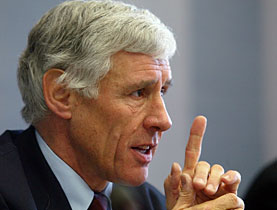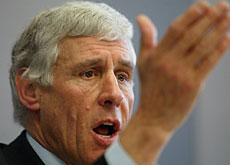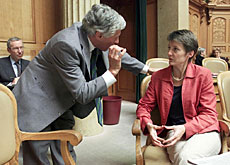Watchdog Strahm bows out from friends and foes

As Swiss price regulator Rudolf Strahm retires on Sunday he knows that during his four years in office in Bern he has made many friends... and quite a few enemies.
He tells swissinfo that among the friends are the consumers who have benefited from the average SFr300 million ($273.6 million) in price cuts that he and his staff have achieved each year.
His adversaries include politicians, big companies, utilities and those who are against competition when it comes to importing goods into Switzerland.
In a book just published, Strahm makes a plea for support of Switzerland’s system of vocational training, which he argues has contributed to the country’s wealth.
swissinfo: Why does Switzerland need a price watchdog?
Rudolf Strahm: We need a price regulator because we have many monopolies; we have many prices fixed by the state, so we have prices that are not created by competition. I think we need a control against abuse of prices.
swissinfo: Are we paying too much for imports? That’s been one of the big issues over your four years, what has been termed “high price island Switzerland”.
R.S.: I think the import price question is the most crucial one because we are a small country and not integrated in the European market. We have different rules and this means obstacles to free imports. Altogether they create a lack of competition when importing.
We have no parallel imports where there are patents on products.
We have technical obstacles, for example all consumer products must have a label with three languages, and so when we import products from the European market, the label or the packaging must be changed only for this small market Switzerland.
swissinfo: Can you put a price on that, how much it costs the country?
R.S.: We have imports of SFr180 billion and on average we calculated that overpricing, compared with the prices of the same products in European countries, is between 20 and 30 per cent.
swissinfo: What is your message to politicians about the high prices we have in Switzerland?
R.S.: My appeal to parliament, where I worked for 13 years as a member, is to open the borders, and abolish technical and other import barriers. We need more import competition.
swissinfo: Despite the higher prices you’ve mentioned, your recent book has the title “Why we are so rich”. Isn’t that some kind of contradiction?
R.S.: It may at first sight seem a contradiction between our high prices and our wealth but I wanted to show that our wealth is mainly caused by the competitiveness of our export industry, of the high precision, of the high quality of work, and that comes as a result of our occupational training system.
Remember that 70 per cent of young Swiss start their career in a profession with an apprenticeship. Young people start in a company. Half the time they are working there and the other half they are trained in a state school.
swissinfo: How much real clout or power does Switzerland’s price regulator have?
R.S.: The price regulator has no possibility to impose penalties. He has the possibility to make recommendations to the authorities in all cases of state pricing and he also has the right to publish them. The publication of our calculations is a very strong measure in the political process.
As far as the dominant market firms are concerned, we have also the possibility to fix prices, but the companies also have the right to make an appeal to the courts, so you see the price regulator has very limited power. However, the publicity around our recommendations gives us a certain political and moral power.
swissinfo: How does your power compare with that of people in similar jobs in other countries?
R.S.: All over Europe we now have price regulators. Sometimes they are in a ministry, sometimes in an office. Many have more possibilities, for example, to impose penalties but sometimes they are also under stronger political control.
In Switzerland, the price regulator is independent. I am not dependent on the government’s decisions or will. I’ve had many conflicts with the government and I think this gives me a certain strength in the public eye.
swissinfo: How much have you been a thorn in the flesh of not only politicians but also companies?
R.S.: You must know every price conflict is a conflict of interests. As soon as you speak about prices, the friendship is over. That’s why the price regulator can never be a person who is very well accepted in industry circles.
swissinfo: What do you think you’ve achieved over the past four years?
R.S.: When we do our calculations from price reductions, the savings were about SFr300 million per year. Apart from that, we made many recommendations to parliament and the government, even to local governments, the cantons and communes, and they also had an influence on controlling prices.
The very existence of a price regulator means someone is controlling, somebody is calculating, someone is giving principles for price calculation and cost supervision. This function is a very good one in favour of the consumer.
swissinfo: What about failures?
R.S.: I cannot deny that I had many failures, in certain cases with big international companies, for example with cinema prices that are higher than in other European countries. I couldn’t do anything for the consumer.
Three big United States film companies present more than two-thirds of the films shown in Swiss cinemas and they dominate the market. They fix the prices themselves and all have company headquarters that are located outside Switzerland, so a small man in Bern has no real power against them.
I’ve also had some failures with Cablecom, another big US company, and with prices of the big pharmaceutical companies. They have a very big political influence. Sometimes we reached agreement but I cannot be satisfied in all fields.
swissinfo-interview: Robert Brookes
Born in 1943, Strahm grew up in the Emmental region. After an apprenticeship as a laboratory assistant, he went on to gain a diploma as a chemist.
After two years in the chemical industry, he studied economy and business management at Bern University.
Strahm has worked at the United Nations Conference on Trade and Development (Unctad), has lectured at Zurich University and was head of a number of various associations and organisations.
He is the author of a number of books on economic policy and teaches career advisers at the universities of Bern, Fribourg and Zurich.
From 1991 to 2004 he was a Social Democratic member of the Swiss House of Representatives.
In April 2004, he was appointed the federal price regulator by the government, a position he took up in August that year.
He steps down after reaching the retirement age of 65 and will now, among other activities, write columns for two Swiss newspapers and write a blog for the Swiss National Bank.
A nationwide vote clearly voted in favour of a people’s initiative against price abuse on November 28, 1982.
730,938 citizens voted in favour of the initiative and 530,498 were against.
Voters rejected a counter-proposal put forward by the government and parliament which foresaw the monitoring of prices only at times of strong inflation.
The first price regulator, who took up his position at the end of 1972, was Leo Schürmann. He was later appointed director-general of the Swiss Broadcasting Corporation.
Today, the price regulator has a staff of about 20 and an annual budget of SFr2.2 million.

In compliance with the JTI standards
More: SWI swissinfo.ch certified by the Journalism Trust Initiative



You can find an overview of ongoing debates with our journalists here . Please join us!
If you want to start a conversation about a topic raised in this article or want to report factual errors, email us at english@swissinfo.ch.